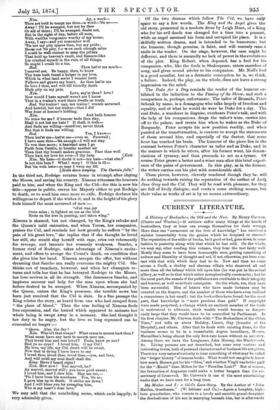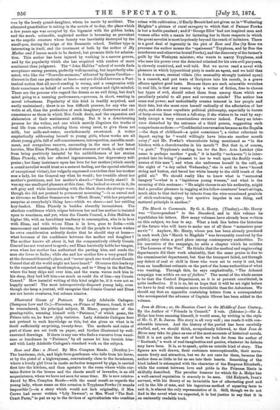won by the lovely grand-daughter, whom he meets by accident.
The alienated grandfather is taking in the novels of to-day, the place which a few years ago was occupied by the bigamist with the golden locks, and the meek, estimable, neglected mother is becoming as prevalent as the angelic creature whose beauty was inevitably destroyed by the small-pox, during the reign of the Romantic school. Neither type is interesting in itself, and the treatment of both by the author of My Mother and I leaves much to be desired, but presents little for admira- tion. This author has been injured by working in a narrow groove, and by the popularity which she has acquired with readers of more sentiment than judgment. The "John Halifax" school of novels finds acceptance among persons, perfectly well-meaning, but imperfectly edu- cated, who like the "Nouvelle-sermone," abhorred by Queen Caroline— discreet in that one particular at least—and are divided between a 'NH- tanical notion that all novel-reading is wrong, and a compromise with their conscience on behalf of novels so very serious and right-minded. These are the persons who regard the drama as an evil thing, but don't mind going to a morning performance,—persons, in short, wanting in moral robustness. Popularity of this kind is readily acquired, and easily maintained ; there is no less difficult process, for any who can write at all, than the production of such imaginary characters and cir- cumstances as those in which Mrs. Craik deals, and the expansion and elaboration of their sentimental setting. But it is a deteriorating process for the writer, and one which merely disguises the truths of real life from readers, refusing them strong meat, to give them not milk, but milk-and-water, unwholesomely sweetened. A writer emphatically addressing herself to young girls, whose works are all about young girls, full of self-consciousness, introspection, maudlin senti- ment, and scrupulous reserve, amounting in the case of her latest heroine, Miss Elms Picardy, to a distinct absence of truth, is only saved from being positively harmful by the unlifelikeness of her stories. Elms. Picardy, with her affected ingenuousness, her deprecatory self- praise ; her fussy insistence upon her love for her mother (which surely a sound novelist would treat as a natural feeling, not the special attribute of exceptional virtue), her vulgarly expressed conviction that her mother was a lady, let the General say what he would ; her twaddle about her mother's prettiness, and her mother's shawl—" that lovely shawl 1 It was my one unalloyed pleasure at this time. She 1poked so sweet in it, its soft grey and white harmonising with the black dress she always wore, though she did not pretend to permanent mourning "—is as unreal and as tiresome as Esther Summerson in "Bleak House," with her perpetual surprise at everybody's liking her—which we share—and her rattling key-basket. Elms. Picardy is besides absurdly inconsistent. The absolute confidence which reigns between her and her mother is insisted upon to weariness, and yet, when the Cousin Conrad, a John Halifax in higher life, with an hereditary tendency to consumption, who is in love with Elma, and with whom Elma is in love, goes to India—with unnecessary and unamiable heroism, for all the people to whose wishes he owes consideration ardently desire that he should stay at home— what becomes of the confidence between the mother and daughter ? The mother knows all about it, but the comparatively elderly Cousin Conrad has not ventured to speak ; and Elma heroically holds her tongue, even when her mother has authorised the parting kiss, and sends the man she loves to India; while she and her mother live a very grand life at the deceased General's place, and "never speak one word about Cousin Conrad that all the world might not have heard." Of course this leads up to the expected meeting at Southampton, and to " Deep in the Red Sea, where the busy ships sail over him, and the warm waves rock him in his sleep, they had left him—as much as could die of him—my Cousin Conrad." How harmful writing of this kind might be, if it were not so happily unreal! The most introspectively-disposed young lady, even though she keep a journal, will recognise that Cousin Conrad and Elms are not heroic creatures, but solemn ninnies.



































 Previous page
Previous page